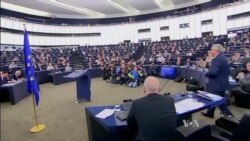The president of the European Commission has called for a European headquarters for a common EU military force in his annual State of the Union speech. Jean-Claude Juncker said Europe’s ‘soft’ power' was no longer sufficient to meet the challenges of the modern world.
“We must have a European headquarters. We must also organize ourselves to work toward a common military force and this should be in complement with NATO. More European defense in Europe doesn't mean less transatlantic solidarity,” he told European lawmakers meeting in Strasbourg Wednesday.
A common European Union military force was something Britain had long resisted, but its influence is already diminished following the June vote to leave the bloc. The U.K. has not been invited to Friday’s informal summit of EU heads of state in Bratislava, Slovakia.
Describing the EU as not in "top condition," Juncker was frank about the challenges facing the bloc.
“I believe the next 12 months are decisive if we want to reunite our union, if we want to overcome the divisions between East and West, which have opened up in recent months,” he said.
Those divisions threaten to overshadow Friday’s summit, says Stephen Booth of policy group Open Europe.
“Some of these issues between member states of the EU are existential, they’re not simply a matter of personalities. They are about the construction of the European Union.”
Refugees
Eastern member states, including Slovakia, have resisted Brussels’ plans for a compulsory quota system to resettle refugees across the EU. The dispute escalated this week when Luxembourg’s foreign minister said Hungary should be thrown out of the bloc for its hardline stance on the refugee crisis, which included erecting a border fence to keep out migrants.
“I am urging the Slovak presidency to bridge the divergences and differences between those who are reluctant to integrate refugees in their societies and those who are convinced, as I am, that the fair share in the relocation and resettlement is of the essence,” Juncker told Members of the European Parliament.
East and west
The divergences between east and west go beyond the refugee crisis, says Stephen Booth.
“Particularly after the Brexit vote, the eastern European member states talk much more about sort of transferring power away from the institutions."
But these dynamics aren’t just between east and west, Booth went on to say. "They are actually between the Brussels institutions, their view of what the EU might and should look like, and an increasing desire from all member states to sort of have a much more intergovernmental approach.”
The fractures between east and west could be further underlined next month, when Hungary holds a referendum on whether to accept EU refugee quotas.





